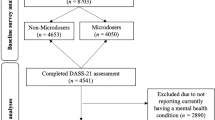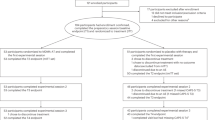Abstract
Refugees flee their country of origin to escape threats to their existence. Yet, despite having left behind the immediate physical dangers in their country of origin, refugees may continue to experience negative psychological consequences of contemporary violence in that country because of their connection to it. Here, using longitudinal population data from Denmark, we show that refugees were substantially more likely to use antidepressants, and anxiolytic and hypnotic drugs in periods when their country of origin was more intensely afflicted by terrorism. The finding that contemporary terrorism in the home country is negatively associated with the mental health of refugees highlights the potential vulnerability of such groups and points to the need to identify the extended global consequences of terrorism.
This is a preview of subscription content, access via your institution
Access options
Access Nature and 54 other Nature Portfolio journals
Get Nature+, our best-value online-access subscription
$29.99 / 30 days
cancel any time
Subscribe to this journal
Receive 12 digital issues and online access to articles
$119.00 per year
only $9.92 per issue
Buy this article
- Purchase on Springer Link
- Instant access to full article PDF
Prices may be subject to local taxes which are calculated during checkout




Similar content being viewed by others
Data availability
The data regarding terrorism is freely available from the Global Terrorism Database (https://start.umd.edu/gtd/). The individual-level data contains information that may enable identification of individuals. Therefore, the dataset cannot be made publicly available. To acquire access to the data used in this study, researchers must apply for permission from the Danish National Board of Health (www.sundhedsstyrelsen.dk) and Statistics Denmark (www.dst.dk), and register the study at the Danish Data Protection Agency (www.datatilsynet.dk). Only researchers affiliated with institutions approved by Statistics Denmark can access the data via their remote access system.
Code availability
The code to reproduce all results reported in the manuscript is available on request.
References
Global Trends. Forced Displacement in 2018 (UNHCR, 2019).
Scott, S. T. Multiple traumatic experiences and the development of posttraumatic stress disorder. J. Interpers. Violence 22, 932–938 (2007).
Garfin, D. R., Holman, E. A. & Silver, R. C. Cumulative exposure to prior collective trauma and acute stress responses to the Boston Marathon bombings. Psychol. Sci. 26, 675–683 (2015).
Schiller, N. G., Basch, L. & Blanc, C. S. From immigrant to transmigrant: theorizing transnational migration. Anthropol. Q. 68, 48–63 (1995).
Hansen, B. T., Dinesen, P. T. & Østergaard, S. D. Increased incidence rate of trauma- and stressor-related disorders in Denmark following the Breivik attacks in Norway. Epidemology 28, 906–909 (2017).
Giacco, D., Laxhman, N. & Priebe, S. Prevalence of and risk factors for mental disorders in refugees. Semin. Cell Dev. Biol. 77, 144–152 (2018).
Björkenstam, E., Vinnerljung, B. & Hjern, A. Impact of childhood adversities on depression in early adulthood: a longitudinal cohort study of 478,141 individuals in Sweden. J. Affect. Disord. 223, 95–100 (2017).
Hyde, J. S., Mezulis, A. H. & Abramson, L. Y. The ABCs of depression: integrating affective, biological, and cognitive models to explain the emergence of the gender difference in depression. Psychol. Rev. 115, 291–313 (2008).
Salk, R. H., Hyde, J. S. & Abramson, L. Y. Gender differences in depression in representative national samples: meta-analyses of diagnoses and symptoms. Psychological Bull. 143, 783–822 (2017).
Colucci, E., Szwarc, J., Minas, H., Paxton, G. & Guerra, C. The utilisation of mental health services by children and young people from a refugee background: a systematic literature review. Int. J. Cult. Ment. Health 7, 86–108 (2014).
Borjas, G. J. Economic theory and international migration. Int. Migr. Rev. 23, 457–485 (1989).
Hansen, B. T., Østergaard, S. D., Sønderskov, K. M. & Dinesen, P. T. Increased incidence rate of trauma- and stressor-related disorders in Denmark after the September 11, 2001, terrorist attacks in the United States. Am. J. Epidemology 184, 494–500 (2016).
Stein, B. D. et al. A national longitudinal study of the psychological consequences of the September 11, 2001 terrorist attacks: reactions, impairment, and help-seeking. Psychiatry Interpers. Biol. Process 67, 105–117 (2004).
Ahern, J. et al. Television images and psychological symptoms after the September 11 terrorist attacks. Psychiatry 65, 289–300 (2002).
Silver, R. C. et al. Mental- and physical-health effects of acute exposure to media images of the September 11, 2001, attacks and the Iraq war. Psychol. Sci. 24, 1623–1634 (2013).
Holman, E. A., Rose, D. & Cohen, R. Media’s role in broadcasting acute stress following the Boston Marathon bombings. Proc. Natl Acad. Sci. USA 111, 93–98 (2014).
Pedersen, C. B. The Danish civil registration system. Scand. J. Public Health 39, 22–25 (2011).
The Classification of Mental and Behavioural Disorders. Diagnostic criteria for research 10th revision (ICD-10) (World Health Organization, 1993).
Diagnostic and Statistical Manual of Mental Disorders 5th edn (DSM-5) (American Psychiatric Association, 2013).
Thoresen, S., Jensen, T. K., Wentzel-Larsen, T. & Dyb, G. Parents of terror victims. A longitudinal study of parental mental health following the 2011 terrorist attack on Utøya Island. J. Anxiety Disord. 38, 47–54 (2016).
Bowler, R. M. et al. Police officers who responded to 9/11: comorbidity of PTSD, depression, and anxiety 10–11 years later. Am. J. Ind. Med. 59, 425–436 (2016).
Kildemoes, H. W., Sørensen, H. T. & Hallas, J. The Danish national prescription registry. Scand. J. Public Health 39, 38–41 (2011).
Global Terrorism Database Codebook (National Consortium for the Study of Terroism and Responses to Terrorism, 2014).
Global Terrorism Index 2017. Measuring and Understanding the Impact of Terrorism (The Institute for Economics and Peace, 2017).
Acknowledgements
We thank participants at the annual conference of the Danish Political Science Association, at the Oslo Workshop on Subnational and Historical Dimensions of Conflict, and at a seminar in the Department of Political Science, University College London for insightful feedback and helpful comments. We also thank F. J. Jørgensen for research assistance. This research was supported by The Carlsberg Foundation, grants CF11-0609 (to P.T.D.) and CF14-0703 (to K.M.S.). The funder had no role in the study design, in the collection, analysis, and interpretation of data, in the writing of the report, or in the decision to submit the paper for publication.
Author information
Authors and Affiliations
Contributions
The data for this study were acquired by K.M.S., P.T.D. and S.D.Ø. All authors contributed to the design of the study. The analyses were conducted by K.M.S., B.D. and B.T.H. All authors contributed to the interpretation of the results. The manuscript was drafted and revised by P.T.D. and K.M.S. with contributions from all other authors. The final version of the manuscript was approved by all authors prior to submission.
Corresponding author
Ethics declarations
Competing interests
The authors declare no competing interests.
Additional information
Peer review information Nature Human Behaviour thanks Domenico Giacco, David Laitin and the other, anonymous, reviewer(s) for their contribution to the peer review of this work.
Publisher’s note Springer Nature remains neutral with regard to jurisdictional claims in published maps and institutional affiliations.
Supplementary information
Supplementary Information
Supplementary Information, Supplementary Figs. 1–24, and Supplementary Tables 1–24.
Rights and permissions
About this article
Cite this article
Sønderskov, K.M., Dinesen, P.T., Hansen, B.T. et al. Terrorism in the country of origin is linked to deterioration in the mental health of refugees. Nat Hum Behav 5, 1555–1561 (2021). https://doi.org/10.1038/s41562-021-01123-7
Received:
Accepted:
Published:
Issue Date:
DOI: https://doi.org/10.1038/s41562-021-01123-7



